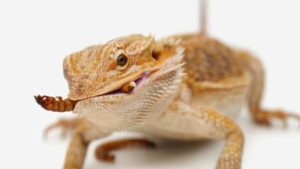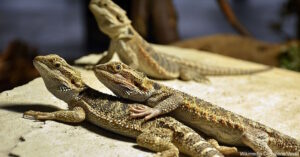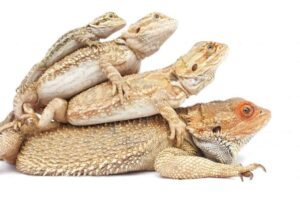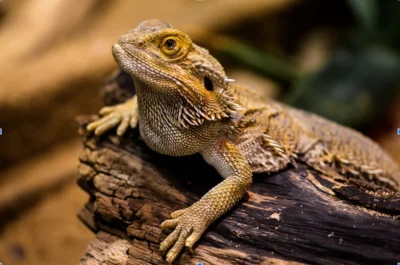Hydration is a critical aspect of reptile care, vital for maintaining their overall health and well-being. As ectothermic creatures, dehydrated bearded dragon rely on external sources to regulate their body temperature and hydration levels, making access to water essential for various physiological functions.
In this guide, we explore the significance of hydration for reptiles, highlighting its role in hydration, thermoregulation, digestion, and overall health maintenance. Understanding the importance of hydration is fundamental for providing optimal care to reptilian companions, ensuring their longevity and vitality in captivity.
Importance of hydration for reptiles

Hydration is crucial for reptiles for several reasons:
- Regulation of bodily functions: Like all animals, reptiles need water to carry out basic bodily functions such as digestion, circulation, and temperature regulation.
- Prevention of dehydration: Reptiles are ectothermic, meaning they rely on external heat sources to regulate their body temperature. This can make them susceptible to dehydration, especially in warm environments where they may lose water through evaporation.
- Shedding: Proper hydration is essential for healthy shedding in reptiles. Dehydration can lead to incomplete or problematic sheds, which may cause discomfort and increase the risk of infection.
- Kidney function: Reptiles excrete waste products through their kidneys, and adequate hydration is necessary for proper kidney function. Dehydration can lead to kidney issues and urinary tract problems.
- Respiration: Some reptiles, like turtles, rely on water to aid in respiration. Dehydration can impair this process and lead to respiratory problems.
- Reproductive health: Hydration is vital for reproductive health in reptiles. Dehydration can affect reproductive behaviors and fertility.
- Overall health and longevity: Proper hydration supports the overall health and longevity of reptiles. Dehydrated reptiles are more susceptible to stress, illness, and other health issues.
It’s essential for reptile keepers to provide access to clean, fresh water at all times and to monitor their reptiles for signs of dehydration, such as sunken eyes, lethargy, and loss of skin elasticity. Depending on the species, some reptiles may also benefit from occasional misting or soaking to help maintain hydration levels.
Understanding Dehydration in Bearded Dragons
Understanding dehydration in bearded dragons is crucial for their health and well-being. Here are some key points:
- Signs of Dehydration: Bearded dragons can show various signs of dehydration, including sunken eyes, wrinkled skin, lethargy, reduced appetite, darkened urates (the solid waste produced by reptiles), and increased thirst.
- Causes: Dehydration in bearded dragons can result from inadequate water intake, insufficient humidity levels in their enclosure, illness, or environmental stressors such as high temperatures or low humidity.
- Prevention: Providing access to clean, fresh water at all times is essential for preventing dehydration. Bearded dragons may not always drink from a water bowl, so offering water through misting or droplets on vegetation can encourage hydration. Additionally, maintaining appropriate humidity levels in their enclosure and ensuring proper temperatures can help prevent dehydration.
- Treatment: If a bearded dragon shows signs of dehydration, immediate intervention is necessary. Providing a shallow dish of water for soaking and encouraging the dragon to drink can help rehydrate them. In severe cases, a veterinarian may administer fluids subcutaneously or intravenously.
- Monitoring: Regularly monitoring your bearded dragon’s hydration status is crucial. This includes observing their behavior, appearance, and hydration levels of their skin and eyes.
- Environmental Considerations: Environmental factors play a significant role in a bearded dragon’s hydration status. Ensure their enclosure provides appropriate humidity levels, proper temperature gradients, and access to fresh water to support their hydration needs.
- Dietary Considerations: Bearded dragons obtain some of their hydration from the foods they eat, especially vegetables and fruits with high water content. Offering a varied diet rich in moisture can contribute to their overall hydration.
Understanding and addressing dehydration promptly is essential for maintaining the health and well-being of bearded dragons. Regular monitoring, providing appropriate environmental conditions, and offering hydration support when needed are key components of proper husbandry for these reptiles.
Recognizing Dehydration and Taking Action

Recognizing dehydration in any animal, including bearded dragons, is crucial for their health. Here’s how to recognize dehydration in bearded dragons and take action:
20 Signs of Dehydration:
- Sunken or dull eyes
- Lethargy and reduced activity levels
- Loss of appetite or reduced food intake
- Dry, wrinkled, or loose skin
- Dark or concentrated urates (solid waste)
- Sticky or tacky mouth and gums
- Reduced urination or infrequent bowel movements
- Panting or open-mouth breathing
- Weakness or unsteadiness when moving
- Lack of interest in drinking water
- Elevated heart rate
- Sunken or flattened fat pads on the sides of the head
- Excessive digging or burrowing behavior
- Constipation or difficulty passing waste
- Reduced elasticity of the skin (skin tenting)
- Increased aggression or irritability
- Reduced body weight or muscle mass
- Pale or discolored skin
- Loss of coordination or balance
- Changes in behavior or temperament (e.g., hiding, seeking cooler areas)
Taking Action:
- Offer Water: Provide access to clean, fresh water at all times. Some bearded dragons prefer to drink from a shallow dish, while others may drink droplets from misting or vegetation.
- Soaking: If a bearded dragon shows signs of dehydration, offering a shallow dish of lukewarm water for soaking can help rehydrate them. Monitor them closely during the soak to ensure their safety.
- Encourage Hydration: If a bearded dragon is reluctant to drink, you can encourage hydration by misting their enclosure, offering moist foods, or gently dripping water onto their nose to stimulate drinking.
- Monitor Health: Keep a close eye on the bearded dragon’s hydration status and overall health. If signs of dehydration persist or worsen, seek veterinary attention promptly.
- Maintain Proper Husbandry: Ensure the bearded dragon’s enclosure maintains appropriate humidity levels, temperature gradients, and lighting. Proper husbandry supports overall health and hydration.
- Emergency Care: In severe cases of dehydration or if the bearded dragon shows signs of illness, seek immediate veterinary care. Veterinarians can provide fluid therapy and other necessary treatments to address dehydration and underlying health issues.
Recognizing dehydration and taking prompt action are essential for the well-being of bearded dragons. Regular monitoring, proper hydration, and veterinary care when needed are key components of responsible reptile ownership.
Ways to keep bearded dragon hydrated

Keeping a bearded dragon hydrated is essential for their health and well-being. Here are several ways to ensure they stay hydrated:
- Provide Fresh Water: Make sure your bearded dragon has access to clean, fresh water at all times. Use a shallow dish that’s easy for them to access and drink from.
- Misting: Regularly misting your bearded dragon and their enclosure with water can help increase humidity levels and provide opportunities for them to lick droplets off surfaces, thus promoting hydration.
- Soaking: Offer your bearded dragon regular soaking sessions in shallow lukewarm water. Soaking not only helps them hydrate by absorbing water through their skin but also aids in loosening shed skin and promoting proper digestion.
- Offer Moist Foods: Provide a varied diet that includes fresh fruits and vegetables with high water content, such as cucumbers, zucchini, and leafy greens. These foods not only contribute to hydration but also offer essential nutrients.
- Droplet Feeding: Some bearded dragons may not drink directly from a water dish. You can try dripping water onto their snout or offering water droplets on vegetation to encourage them to drink.
- Monitor Humidity Levels: Maintain appropriate humidity levels in the bearded dragon’s enclosure, as this can affect their hydration needs. Use a hygrometer to monitor humidity levels and adjust as needed.
- Offer Juicy Insects: If your bearded dragon eats insects, consider offering insects with higher moisture content, such as crickets, roaches, or silkworms.
- Hydration Prior to Brumation: If your bearded dragon goes through a brumation period (a hibernation-like state), ensure they are adequately hydrated before entering this phase.
- Regular Health Checks: Keep an eye on your bearded dragon’s hydration status by monitoring their behavior, appearance, and urates. If you notice any signs of dehydration, take action promptly.
By incorporating these strategies into your bearded dragon’s care routine, you can help ensure they remain properly hydrated, promoting their overall health and well-being.
Dangers of dehydration for bearded dragons
Dehydration poses several dangers to the health and well-being of bearded dragons:
- Organ Dysfunction: Dehydration can impair the proper functioning of vital organs, including the kidneys and digestive system. This can lead to various health issues, such as kidney failure, gastrointestinal problems, and metabolic imbalances.
- Electrolyte Imbalance: Dehydration disrupts the balance of electrolytes in the body, including sodium, potassium, and calcium. Electrolyte imbalances can cause muscle weakness, tremors, seizures, and cardiac abnormalities.
- Reduced Immune Function: Dehydration weakens the immune system, making bearded dragons more susceptible to infections and illnesses. This can prolong recovery times and increase the risk of complications from common health issues.
- Digestive Problems: Proper hydration is essential for healthy digestion in bearded dragons. Dehydration can lead to constipation, impaction (intestinal blockage), and difficulty passing waste, which can be painful and potentially life-threatening if left untreated.
- Heat Stress: Bearded dragons rely on external heat sources to regulate their body temperature. Dehydration reduces their ability to thermoregulate effectively, increasing the risk of heat stress or heat stroke, especially in hot environments.
- Skin and Shedding Issues: Dehydrated bearded dragons may experience problems with shedding, including retained shed, incomplete sheds, and skin irritation. Dehydration can also cause the skin to become dry and brittle, leading to discomfort and increased susceptibility to injury and infection.
- Lethargy and Weakness: Dehydration can cause lethargy, weakness, and reduced activity levels in bearded dragons. This can impact their quality of life and hinder their ability to engage in normal behaviors, such as hunting, basking, and exploring.
- Long-Term Health Complications: Chronic dehydration can have long-term consequences for bearded dragons, potentially reducing their lifespan and overall health. Repeated or prolonged bouts of dehydration can damage organs and lead to irreversible health problems.
It’s essential for bearded dragon owners to monitor their pets closely for signs of dehydration and take prompt action to address any hydration issues. Providing access to clean, fresh water, maintaining appropriate humidity levels, offering regular soaking sessions, and ensuring a balanced diet are crucial steps in preventing dehydration and promoting the health and well-being of these reptiles.
Conclusion
A dehydrated bearded dragon poses significant risks to its health and well-being. Recognizing the signs of dehydration, such as sunken eyes, lethargy, and reduced appetite, is crucial for prompt intervention.
Addressing dehydration promptly through measures such as providing access to clean water, offering regular soaking sessions, and maintaining appropriate humidity levels in their enclosure is essential for preventing complications and promoting their overall health.
If a bearded dragon shows signs of dehydration, seeking veterinary care for a proper diagnosis and treatment plan is necessary to ensure their recovery and well-being.

